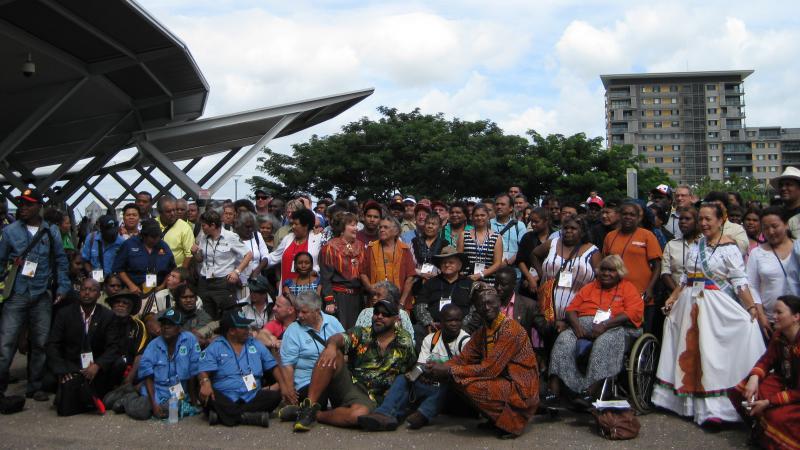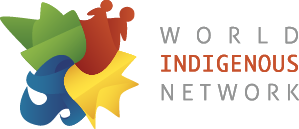Indigenous Peoples’ and Local Community Conserved Territories and Areas (ICCAs) –a powerful solution highlighted at the World Indigenous Network Conference in Australia
26 May 2013
Darwin, Northern Territory, Australia – Today was marked as an important day for the emerging global movement of Indigenous Peoples’ and Local Community Conserved Territories and Areas (ICCAs) [1], which are powerful examples of collective decision-making and stewardship for nature and culture. ICCAs constitute the oldest form of “conservation” on earth. Delegates of ICCA Consortium [2] participating at the pioneer World Indigenous Network (WIN) Conference organized a half a day ICCA-related events where relevant information and experiences on this global movement was shared. ICCAs are found all over the planet, span all types of ecosystems and have been estimated to encompass more areas and territories than officially designated protected areas, nearly 13% of earth’s land surface (Technical Series 64, UN Convention on Biological Diversity).
In the morning, Dr. M. Taghi Farvar, President of the ICCA Consortium, during his keynote address presented the main features of ICCAs, highlighted their contributions in conservation and among others specific threats faced by these areas. He stated that
“ICCAs are integral to empowerment of indigenous peoples and local communities as they not only play a key role in conservation and securing their rights to land and natural resources but are also the foundation of their cultural identity and pride. They command respect for local results & capacities in the face of so much environmental mismanagement and disasters elsewhere…. Among the threats to ICCAs, nationalisation, privatisation and forced evictions and imposition of destructive practices resulting from combined private interests and government decisions represent an important threat to these jewels of bio-cultural diversity of the world”.
The workshop that followed on ‘Networking for the Respectful and Appropriate Recognition of ICCAs’ highlighted important lessons learned in years of networking, exchanges and advocacy in support of ICCAs in countries as different as Australia, Iran, Nepal, and the Philippines.

Giovanni Reyes, representative of the Consortium’s Member KASAPI (National Coalition of Indigenous Peoples in the Philippines) presented how KASAPI plays a vital role in facilitating multi-sectoral and collaborative engagements among the Philippines’ indigenous peoples, premier academic institutions, government authorities, relevant civil society organizations and international development agencies. He said, “The defense of ICCAs is a daunting task for indigenous peoples alone. No longer are struggles just between IP communities versus powerful economic and natural forces. We seek the support oflike-minded groups and organizations nationally and globally because the threats to our ICCAs are national and global.” He added that “conservation of terrestrial and aquatic resources is intrinsically linked to indigenous traditional knowledge… and indigenous peoples have been implementing the UN-CBD objectives. If governments want to effectively pursue thenew CBD targets and plans (2020), they hadbetter work with and through ICCAs….”
Reyes noted that his country’s experience was observed with keen interest by Taiwanese indigenous peoples following a four-day Philippine-Taiwan ICCA exchange held in Taiwan recently brokered by the ICCA Consortium. It is expected that work towards strengthening of ICCAs will be initiated among ethnic groups within Taiwan and between Taiwan and the Philippines. He further said expansion of ICCAs is foreseeable in the near future as the two country’s concerted efforts on networking for ICCAs will trigger the creation of an “East-Asia ICCA Corridor” that will bridge the two countries’ local ICCAs and regional ICCA networks.
Dermot Smyth, one of the pioneering contributors in works towards Indigenous Protected Areas (IPAs) in Australia, showcased the successful experience of Dhimurru IPA, a “country-based” integrated land and sea territory of Aboriginal peoples in the Northern Territory. Experiences of national networking for the support of ICCAs from Nepal and Iran were also shared.
Following the ICCA workshop, the first comprehensive ICCA Toolkit was launched by UNEP-WCMC and UNDP. Ms Colleen Corrigan, from UNEP-WCMC noted the value of the Toolkit for indigenous peoples and local communities for recognition and support to ICCAs. Colleen further stated that “it has been designed and written specifically for locally governed and managed protected areas and other conservation initiatives. Sixteen case studies from around the world highlight innovative tools and approaches that local communities and indigenous peoples have developed to address critical challenges that affect their natural and cultural resources. It includes a diverse set of resources organized around five key themes (documentation, management planning, monitoring and evaluation, communication, and finance and values) to assist civil-society led initiatives around the world to voluntarily conserve ICCAs.
At the end of the day, the importance of ICCAs as well as networking for recognition and support of ICCAs were discussed. Enhanced collaboration and partnership between ICCA Consortium and future processes of World Indigenous Network were acknowledged.
The ICCA Consortium, a global association of indigenous peoples’ and local communities’ organizations and supporting NGOs, was born to uphold ICCAs and make sure that their processes of recognition are respectful and appropriate. It has been involved in global networking, advocacy for ICCAs in international policy processes as well supporting regional, country and grassroots initiatives.


